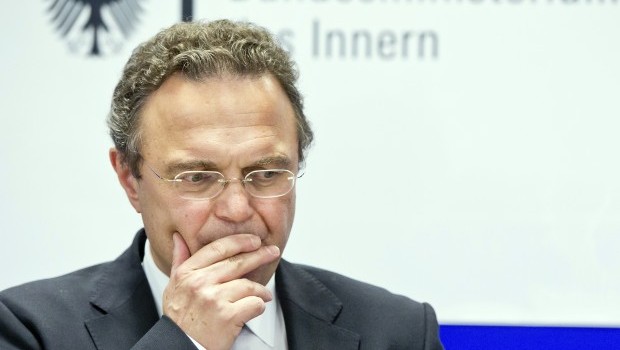
In this July 5, 2013 file picture German Interior Minister Hans-Peter Friedrich attends a press conference in Nuremberg, Germany. Source: AP Photo/DPA/Daniel Karmann
Berlin, AP—Allegations of widespread US data surveillance have created turbulence for Angela Merkel on what looked like a smooth cruise to a third term as German chancellor, even though it remains to be seen whether the flap will threaten her seriously.
Merkel’s center-left opponents have seized on disclosures of National Security Agency surveillance programs by leaker Edward Snowden to assert that she hasn’t been doing enough to confront Washington and protect Germans’ personal data—and to cast doubt on officials’ assertions that they didn’t know of the programs.
The opposition apparently hopes that the issue will breathe life into a so-far stumbling and gaffe-prone campaign for September 22 parliamentary elections. A healthy economy, low unemployment and perceptions that Merkel has managed Europe’s debt crisis well have bolstered the chancellor.
Merkel’s center-left challenger, Peer Steinbrueck, is suggesting that the government turned a blind eye to violations of Germans’ rights and that Merkel violated her oath of office, in which she swore to “keep damage from” her people.
The government, opposition Green party leader Juergen Trittin said, is acting “like the famous three monkeys: hear no evil, speak no evil and definitely see no evil.”
His party called for Germany to take in Snowden. Merkel’s government, like many others, rejected his asylum request.
Protecting personal data is generally a more sensitive issue in Europe than in the US—and particularly in Germany, not least because of memories of surveillance and repression by communist East Germany’s secret police, the Stasi, and the Nazis’ Gestapo.
When President Barack Obama visited Berlin June 19, Merkel offered cautious public criticism, saying that a “balance” between national security and data protection must be ensured.
Then, the German weekly Der Spiegel reported that the US bugged European Union offices—prompting officials to say that if true, that would be unacceptable, especially since the Cold War is over. Germany hosted major NSA sites during the Cold War.
Merkel, who grew up in communist East Germany, dispatched her interior minister, Hans-Peter Friedrich, to Washington last week to discuss the spying issue. There, he conferred with Attorney General Eric Holder and had an unscheduled meeting with Vice President Joe Biden.
After those meetings Friday, Friedrich told German television that PRISM, the secret US program described by Snowden, searches in a “very targeted” way for terrorism-related information and that the NSA says its information helped prevent five attacks in Germany.
Friedrich’s defense of surveillance programs prompted opponents to turn up the heat, charging that he returned empty-handed after promising to secure information from the Americans. Steinbrueck told the Bild am Sonntag newspaper that the German minister was “fobbed off with a few inconsequential comments and alleged concessions.”
The opposition is also asking what Germany’s own intelligence services knew about the programs. Germany’s foreign intelligence service is ultimately supervised by Merkel’s chief of staff, Ronald Pofalla.
Some 79 percent of Germans surveyed in a July 9-11 poll by the Forschungsgruppe Wahlen group for ZDF television said they thought the German government knew of widespread US surveillance.
However, the same poll found that 62 percent would prefer Merkel as chancellor, with only 29 percent for Steinbrueck. And it showed her current center-right coalition close to a parliamentary majority, with Merkel’s conservative Union bloc enjoying a 15-point lead over Steinbrueck’s Social Democrats.
The poll of 1,338 people had a margin of sampling error of plus or minus three percentage points.
Peppered with questions about surveillance in a television interview Sunday, Merkel responded with a combination of tough talk and a tried-and-tested calm, methodical approach. She didn’t respond directly to Steinbrueck’s attacks, a tactic that has served her well with voters—and frustrated rivals—since she took office eight years ago.
She said Germany expects “a clear commitment from the American government for the future that they will keep to German law on German soil.” She added, however, that she has no evidence at this point that it hasn’t done so in the past and that Friedrich’s visit “can only be a first step” in a dialogue with the US.
Merkel also called for tougher European and global rules on data protection, and said the US has pledged to declassify some documents.
Friedrich defended his talks in Washington, telling ARD television that “all this talking and muscle-flexing” on the issue “is nonsense.”
“We have to find a joint way forward.” he said. “The Americans know our sensitivities. They are ready to clear things up and, of course, we must draw our own lines.”
Manfred Guellner, the head of Forsa, another polling agency, said he believes the fallout for the chancellor from the issue will be “absolutely minimal, because there is nothing that can be hung on Merkel alone.”
“People from all parties … either knew about it or didn’t,” he added, noting that Steinbrueck’s party was in government until 2009.
